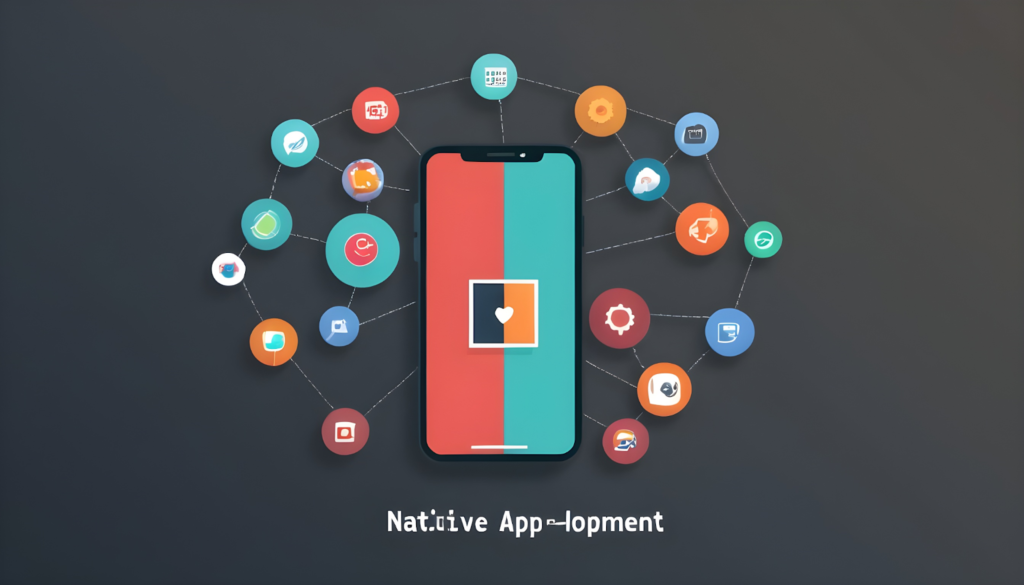Native vs Hybrid App Development: Choosing the Right Path for Your Project
In today’s digital age, mobile applications have become an integral part of our lives. Whether it’s for business, entertainment, or personal use, mobile apps have transformed the way we interact with technology. When it comes to developing a mobile app, one of the crucial decisions you’ll face is choosing between native and hybrid app development. This article aims to provide a comprehensive understanding of both approaches and help you make an informed decision for your project.
Understanding Native App Development
Native app development involves building applications specifically for a particular platform, such as iOS or Android, using programming languages and tools native to that platform. This approach allows developers to leverage the full potential of the platform, resulting in high performance, seamless user experiences, and access to device-specific features.
Advantages of Native App Development:
Performance: Native apps are known for their superior performance due to their direct integration with the underlying operating system. They can leverage hardware acceleration and utilize platform-specific optimizations, resulting in faster load times, smooth animations, and overall responsiveness.
User Experience: Native apps provide a native look and feel, adhering to the design standards and guidelines of the respective platforms. This familiarity enhances the user experience, promoting user engagement and satisfaction.
Access to Device Features: Native apps have unrestricted access to the device’s features, such as camera, GPS, accelerometer, and more. This allows developers to create feature-rich applications that can utilize the full potential of the device.
Challenges of Native App Development:

Development Time and Cost: Building native apps for multiple platforms requires separate development efforts, increasing the overall development time and cost. Each platform requires a dedicated team of developers with platform-specific expertise.
Maintenance: As native apps are developed separately for each platform, updates, and bug fixes need to be implemented individually. This can lead to increased maintenance efforts and costs.
Platform Specificity: Native apps are platform-specific, meaning that an app built for iOS won’t run on Android without significant modifications. This can limit your app’s potential audience and require additional resources for platform expansion.
Exploring Hybrid App Development
Hybrid app development combines elements of both native and web technologies. It involves building a single codebase that can be deployed across multiple platforms using frameworks such as React Native or Flutter. Hybrid apps are essentially web applications embedded within a native container, providing a cross-platform solution.
Advantages of Hybrid App Development:
Cross-Platform Compatibility: Hybrid apps allow you to write code once and deploy it across multiple platforms. This significantly reduces development time and costs, as you don’t need separate teams for each platform.
Faster Development: With hybrid app development, you can develop features more rapidly compared to native app development. This is because most of the code is shared across platforms, allowing quicker iterations and updates.
Cost-Effectiveness: Building a single codebase for multiple platforms reduces development costs, making hybrid app development a cost-effective solution, particularly for startups and small businesses.
Challenges of Hybrid App Development:
Performance Limitations: Hybrid apps rely on web technologies, which can result in performance limitations compared to native apps. While advancements in frameworks have improved performance, hybrid apps may still struggle with complex animations and heavy processing tasks.
Limited Access to Native Features: Hybrid apps have limited access to device-specific features compared to native apps. Some advanced functionalities may not be readily available or may require additional customization.
Dependency on Third-Party Tools: Hybrid app development often relies on third-party tools and frameworks, which might introduce additional dependencies and potential compatibility issues. It’s essential to choose reliable and well-maintained tools to ensure long-term stability.
Critical Factors for Selecting Between Native and Hybrid Development

When deciding between native and hybrid app development, several key factors need to be considered:
Project Requirements and Goals: Evaluate your project’s specific requirements and goals. Consider the complexity of the app, the need for specific device features, and the desired user experience. This will help determine whether native or hybrid development is the best fit.
Target Audience and Platform Preferences: Consider your target audience and their platform preferences. If your audience predominantly uses a specific platform, a native app might provide a more optimized experience. However, a hybrid app might be more practical if your target audience is diverse across platforms.
Budget and Time Limitations: Evaluate your financial resources and project timeline. Native app development generally requires more resources in terms of developers and time. If you have limited resources or a tight deadline, hybrid app development might be a more feasible option.
Long-Term Maintenance and Scalability: Consider the long-term maintenance and scalability of your app. Native apps may require separate updates for each platform, while hybrid apps benefit from shared codebases. Additionally, consider future platform expansion and the potential need for additional resources.
Performance Requirements: Evaluate the performance requirements of your app. If your app heavily relies on complex animations, real-time data processing, or computationally intensive tasks, native app development might be more suitable. However, if performance is not a critical factor, hybrid app development can suffice.
Access to Device Features: Determine the importance of accessing specific device features. If your app heavily relies on utilizing device-specific capabilities, such as ARKit for augmented reality or CoreML for machine learning, native app development provides more flexibility and control.
Developer Skillset and Resources: Assess the skillset and resources available within your development team. If you have experienced native developers with platform-specific expertise, native app development might be a smoother process. However, if your team is more proficient in web technologies, hybrid app development can be a more accessible option.
Conclusion
Choosing between native and hybrid app development is a crucial decision that can greatly impact the success of your project. Both approaches have their advantages and challenges, and the right choice depends on various factors such as project requirements, target audience, budget, and time constraints. you can make an informed decision that aligns with your project goals and resources. Remember, the ultimate goal is to provide a high-quality, user-friendly app that meets the needs of your audience, regardless of the development approach you choose.
FAQs:
Q: What is the difference between native and hybrid app development?
A: Native app development involves building applications using technologies and programming languages specific to a particular platform, such as Swift for iOS or Java for Android. On the other hand, hybrid app development combines native technologies and web technologies to create cross-platform applications that can run on multiple devices and operating systems.
Q: What are the advantages of native app development?
A: Native apps offer several advantages, including:
- Performance: Native apps are optimized for a specific platform, resulting in faster and smoother performance.
- User Experience: Native apps provide a seamless and intuitive user experience, as they are designed specifically for the platform they run on.
- Access to Device Features: Native apps have direct access to device features and APIs, allowing developers to leverage the full capabilities of the device.
Q: What are the challenges of native app development?
A: Native app development comes with some challenges, including:
- Development Time and Cost: Building separate apps for different platforms can increase development time and cost.
- Maintenance: Maintaining and updating separate codebases for each platform requires additional effort and resources.
- Platform Specificity: Native apps are platform-specific, meaning they cannot run on other platforms without significant modifications.
Q: What are the advantages of hybrid app development?
A: Hybrid apps offer several advantages, including:
- Cross-Platform Compatibility: Hybrid apps can run on multiple platforms, allowing businesses to reach a wider audience without duplicating development efforts.
- Faster Development: Developing a single codebase for multiple platforms reduces development time and effort.
- Cost-Effectiveness: Building a hybrid app can be more cost-effective compared to developing separate native apps for each platform.
Q: What are the challenges of hybrid app development?
A: Hybrid app development has some challenges, including:
- Performance Limitations: Hybrid apps may not perform as well as native apps, especially for complex and resource-intensive applications.
- Limited Access to Native Features: Hybrid apps rely on native plugins to access device features, and some features may not be readily available as plugins, requiring additional development effort.
- Dependency on Third-Party Tools: Hybrid app development often relies on third-party frameworks and tools, which may introduce dependencies and potential compatibility issues.
Q: What factors should be considered when choosing between native and hybrid app development?
A: Several key considerations should be taken into account, including:
Project Requirements and Goals: Understand the specific needs and goals of your project.
Target Audience and Platform Preferences: Consider the platforms your target audience uses and their preferences.
Budget and Time Constraints: Evaluate the available budget and time constraints for development.
Long-Term Maintenance and Scalability: Consider the long-term maintenance and scalability requirements of your app.
Performance Requirements: Assess the performance needs of your application.
Access to Device Features: Determine the extent to which your app needs access to native device features.
Developer Skillset and Resources: Consider the expertise and resources available for native or hybrid development.
Q: Can you provide examples of successful native and hybrid apps?
A: Sure! Here are examples of both native and hybrid apps:
Native App Case Study:
– App Overview: [Provide a brief overview of a successful native app]
– Development Approach: [Explain the native development approach used for the app]
– Key Results and Lessons Learned: [Highlight the outcomes and lessons learned from the native app development process]
Hybrid App Case Study:
– App Overview: [Provide a brief overview of a successful hybrid app]
– Development Approach: [Explain the hybrid development approach used for the app]
– Key Results and Lessons Learned: [Highlight the outcomes and lessons learned from the hybrid app development process]
Q: How should I decide between native and hybrid app development?
A: When making a decision, it is important to evaluate your project’s specific needs and goals, consider the target audience and platform preferences, assess budget and time constraints, and consider long-term maintenance and scalability requirements. Additionally, factors such as performance requirements, access to device features, and the available developer skillset and resources should be taken into account. By carefully considering these factors, you can make an informed decision that aligns with your project’s requirements.
Q: Is native app development more costly than hybrid app development?
A: Yes, native app development generally requires higher investment and longer development time compared to hybrid app development. Native apps need to be developed separately for each platform, which can increase development costs. The costs for native app development can vary depending on the complexity, features, and type of application, ranging from $30,000 to over $400,000.

